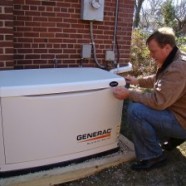Protect Your Family by Installing a Backup Generator
Intense storms are a fact of life in southern Florida, and an almost daily occurrence in some parts of the year. It’s never a matter of whether or not you’ll get a blackout at least once each season. It’s more a question of when and how often. Some power outages are brief and cause little inconvenience, but other major blackouts can last for days, causing you to have to move into a hotel until it’s over.
Savvy homeowners protect their families from the effects of a major blackout by installing a standby generator system. Knowing you have power security will give you a sense of peace of mind, and can ensure your family’s physical safety, as well. Being without power is more than just a quaint overnight camping trip at home. Genuine dangers can arise when you’re without electricity for a length of time, and an emergency power supply can reduce or eliminate those dangers.
Lighting
Emergency candles are just that: made for an emergency. Keeping candles lit for hours on end can be a severe fire danger, especially with bored children running through the house trying to entertain themselves. Flashlights only work until the batteries die, and do nothing for general room light. Worst of all, security lighting outside disappears in a blackout, leaving your family vulnerable to burglars and other criminals. The safest and most reliable lighting method during a power outage is always using a backup generator. A whole home generator will keep your lights on, inside and out, until even the worst blackout is over.
Health
Your family’s health is dependent on electrical power in more ways than you may realize. Without electricity, your family members may:
- trip and fall in darkened rooms, hallways, and stairs
- get burned from using candles and food warmers
- suffer from spoiled food or medication that should be refrigerated
- fall ill from high heat and humidity from lack of air conditioning
Light equals safety in so many ways, and a backup generator will keep your family safe from injury and illness due to lack of power.
Costs
The price of having an electrical service company install a backup generator may seem significant, but your alternate power supply can pay for itself in lower insurance premiums and savings from avoiding losses. Refrigerated and frozen foods shouldn’t be used if stored without power for more than 24 hours. The average family loses hundreds of dollars worth of meat, dairy, and other cold food whenever there’s a significant power outage. Even if you only have a small amount of food on hand, you’ll spend a large amount on ice to keep it cold, and that’s if you can find ice available and without a severe price increase. Keeping the lights on can deter criminals that might otherwise roam your darkened neighborhood, saving you the cost of broken windows and stolen property. For the longest blackouts, families are forced to move into motels and hotels until the power returns, and a standby generator system can save you money by removing the need for that expense. If you have a bad couple of years with significant blackouts, your backup generator system may pay for itself in just a few seasons.
For a professional assessment to determine what size standby generator would work for your home, contact us for a consultation today.
Read MoreGenerator Standby Power: How Much Do You Really Need?
Visions of days without power can send even the most seasoned Florida resident to the phone to consult with an electrician about a standby generator. Between hurricanes, tropical storms, lightning storms, and general wear and tear on public utility systems, the odds of a power outage are good on any given day. A generator can be a lifesaver for those on medical support or businesses that have to keep freezers and refrigerators cold, but homeowners have more leeway in their power choices. When it comes to generator standby power, how much do you really need and how do you choose?
Needs Analysis
Everyone would like their entire electrical system to remain the same, regardless of storms and other problems, but it might not be practical for many homeowners. Often, it’s a matter of determining needs vs. wants. Obviously, the more power you create to be used during an outage, the more expensive your system will be. The smartest choice might be for you to list every electrical item in your house that’s crucial for your daily life, then add up what it costs in terms of electrical power.
The Basics
For most families, keeping the refrigerator and freezer running are a must. Without electrical power, food can go bad at a surprisingly quick rate, and this can add up to huge financial losses for those with freezers full of expensive meat. Families need at least a few lights for safety and comfort, and enough power to run a few fans if the power goes out in the summer. In the winter, space heaters or a furnace are necessities if you’re going to stay home during a blackout, and cell phone chargers are a must in any emergency situation.
Nice-to-Haves
Less crucial but still good to have are the water heater, television for entertaining children and other family members, kitchen appliances, and a computer. For those who work at home, a computer will rise near the top of the list of necessary items, but otherwise it can be downgraded to a luxury. It’s all a matter of priorities. The best way to divide this list is to decide whether you could survive without each item without physical or financial risk. If the answer’s yes, then don’t worry about paying for power to them.
Doing the Math
Generators are rated in size in terms of how many KW, or kilowatts, of electricity they will produce. Choosing the right one for your home is a matter of doing some research, then adding up the numbers. Go online to your appliance’s websites and find out the power usage for each one. Add in the kilowatts used for lights, fans, or any other items you’ve put on your necessary list. Add an extra 25 percent for safety and emergency usage and the final number you reach will tell you the size of your desired generator. If your generator chosen is among the most powerful in the store, you might want to pare down the items you feel you need to live while the power goes out, if you want to keep it a frugal operation.
Cost Analysis
There are two types of cost when it comes to generator standby power. The one most people think of, which is the cost of running the system, isn’t much different from one size generator to the other. The real cost homeowners need to think about is the price of the system itself. You’ll rarely recoup the cost of a generator just by avoiding spoiled food or missed appointments, but the emotional toll placed on your family can mean a lot. Contacting a licensed professional electrician to create a plan for adding a standby generator can give you and your family peace of mind, just knowing a power outage won’t mean living like a camping vacation for days at a time.
Read MoreYour Business Needs a Generator 20 KW or Larger
If your business is in the Northeast, you probably remember the 2003 Blackout that affected 7 large states, plus the province of Ontario, Canada? Even if you weren’t in the affected region, the stories of gas lines and closed businesses stand as an object lesson for yourself and every business owner. Power outages happen, and when they do your business will shut down unless you have an alternate power source.
If you’re in any kind of service industry and keep your power on, a blackout can be one of the most lucrative times of the year. Restaurants, carryout establishments, corner stores with emergency supplies, and gas stations are just some of the businesses offering essential services when no one else in the neighborhood has power in their homes.
Ensuring your power stays on when others don’t can be one of the smartest business decisions you can make. Generators have gotten less expensive in the last two decades, but they’re still an investment. Most businesses will need a generator 20 KW or larger. Here’s how to tell the size of backup system you need.
Essential Equipment and Systems
Your first step is to identify systems and equipment that are essential for your business in order to keep operating. Most places will need:
- Heating, ventilation, and air conditioning
- Major restaurant appliances such as freezers and ovens
- Computers and other office equipment
- Sump pumps and well water pumps
- Lights and alarms
Fuel
Almost all alternate power sources run on natural gas or diesel fuel. Each system has its own advantages and disadvantages, depending on the size of your generator, the part of the country in which you live and work, and your building’s specifications. Speak with a utility company representative to get input on each type of system.
Building Codes and Requirements
Before having a permanent backup generator installed, check with your building owner if you’re leasing the business. He may have concerns about having a permanent installation on his property. If you own your business, look into city property laws dealing with hazardous materials and emergency power equipment. Find out all pertinent building codes to ensure you’re compliant after the work is done. Some cities may regulate the use of manual or automatic transfer switches, or they may have concerns about the means for manual disconnection in case of utility company workers trying to restore power. Check with your electric company for electrical codes and safety guidelines before beginning installation.
Making a Decision
Armed with all this information, contact a licensed electrical contractor. He will work with you to determine the size of backup generator you need to keep your business operating during a prolonged blackout. Once you’ve decided on a generator and installation plan, your contractor will safely install the appliance, making sure it’s safe and up to code with both local and national regulations.
Every emergency is different, and in Florida and other east coast states there may be times when evacuating is a smarter decision than staying home and keeping your business open. But for times when it’s safe to stay but you’re dealing with a prolonged power outage, the convenience of having a backup generator 20 KW or larger as an alternate power source will prove that it’s a good investment for your business.
Read MoreStandby Power Generators: Shouldn’t I Just Rent?
By the time the middle of summer approaches, most Florida residents are thinking about what they need to top off their hurricane supplies. Every year, residents on the Atlantic coast prepare for hurricanes, tropical storms, and the resulting power outages that threaten the area. Most emergency supplies are relatively inexpensive, and can even be used up if the hurricane season passes without a major storm, but one major item is neither: standby power generators.
If you live in an area that’s subject to regular, sustained power outages, it makes sense to keep a standby power supply around, or at least to know where to get one if the lights go out. You might look at the relative costs of buying a standby generator vs. renting one, and decide to take a chance at not needing it often enough to make it worth the expense of purchasing your own. Unfortunately, when the power goes out for more than a few hours, your options will be limited when it comes to getting electricity back into your home.
Cost Comparison
Costs vary depending on brands and your part of the country, but the average rental cost of a medium-sized portable generator runs between 5 and 10 percent of the cost of buying one. If you can find a generator on sale, as they usually are after hurricane season is over, you can close that gap considerably. The bottom line is that when you buy standby power generators, you have the option of waiting around to find the best deal. If you wait until the power goes out to rent one, you’re a captive audience, forced to pay whatever the dealer is charging during an emergency. And it’s doubtful that there will be discounts that week.
Availability
Hardware stores and big box retailers can only stock a certain number of rental generators, in order to make the space cost-effective. If you’re lucky enough to get to the store right after the power goes out, you may be able to rent one of the few samples they keep around. When their supply is gone, they won’t open cases to convert sales models to rental units. They’ll simply switch to a sales-only model, at the full, non-discounted price. Depending on where you live, you may not even have much of a chance of finding a rental generator in the case of a long-term power outage. Even if you do, the chances that it will be the right size for your needs and budget are very small.
Maintenance
When you buy your own standby generator, you take responsibility to keep up the maintenance each season, making sure it’s in top condition so that it works well when it’s needed. After all, an emergency generator has to be a reliable last resort for keeping your home and belongings safe and comfortable. Reputable dealers may service their generators, but there are no guarantees. One lazy employee or busy week where things got forgotten, and you can have a broken generator on your hands with no way to replace it with a working model. You don’t know how the last renter treated it, and you don’t know if the maintenance schedule was followed correctly. With your own model, however, you know you’ve got the best possible chance of having power on all through the outage.
The Right Size
Even if you find an available standby generator at your local store during a power outage, it may not be big enough to power all the equipment you want to keep running. Most emergency rentals are powerful enough to run your refrigerator/freezer, a few lights, and some fans. If you’d like your life during the blackout to be more than simply camping out in your house, you probably want a larger standby generator. The only way to guarantee this is to buy your own before the power goes out. You can find generators that run your computers and television all the way up to whole-house models that let you forget that anything’s wrong in your neighborhood. When you buy your own standby generator, you decide the level of comfort you need when the lights go out.
Read More6 Top Tips for Standby Generator Maintenance
Power outages can range from 2-minute inconveniences to blackouts that last multiple days. The shorter ones can be slightly annoying, but longer blackouts can affect your business or your quality of life. The best way to avoid shutting your business down or suffering through bad weather due to a blackout is to install a standby generator to supplement your basic electrical system. Like any other piece of electrical machinery, generators need to be maintained on a regular basis to keep them in good working order. If you want your standby generator to be reliable in a blackout, you have to be reliable in the care you give it the rest of the year.
Tip #1: Read the Owner’s Manual
Every generator has a slightly different set of procedures for its regular maintenance schedule. Before trying any form of mechanical work on your standby generator, read the manual to find the model-specific advise it offers.
Tip #2: Conduct a Visual Inspection
Whether you have a built-in generator or a portable model, you should visually inspect it on a regular basis. Look for leaves and other plant debris that may have blown into the body that may clog operations. Try spotting puddles of oil and coolant to make sure leaks haven’t developed. Make sure the exhaust port is open and free of clogs.
Tip #3: Change the Oil Regularly
You probably wouldn’t drive your car for a year without changing the oil. The same thing applies to the motor in your standby generator. The oil inside has to be changed on a regular basis, especially after being used for any length of time. After a lengthy period of use, allow the generator to cool down for at least 48 hours. Check the oil to see if it needs changing.
If the oil needs changing, empty out the old oil and replace it with 2 quarts of new. You can use natural oil or synthetic, but synthetic oil works better in extreme cold and higher heat, so it may be a better choice. While you’re changing the oil, change out the old, dirty oil filter and replace it with a fresh one.
Tip #4: Pull the Spark Plugs
Spark plugs can get dirty and corroded in a generator, even with light use. Pull the plugs in yours after one year and compare them to a set of new ones. You’ll probably find that the old set is covered in brown and black corrosion. Replace all the spark plugs with a new set, then mark your calendar to remind yourself to do the same thing next year.
Tip #5: Replace the Air Filter
You know how dirty the air filter gets in a car or your home furnace. Accumulated dust and dirt will eventually clog the air passages, preventing fresh air to move through. Depending on the air quality in your environment, you may have to replace the air filter in your standby generator twice a year or every two years. It’s a simple procedure – just open the cover, slip out the old filter and slide in a new one.
Tip #6: Run the Engine
Start and run your standby generator every month. Let it run until the temperature stays the same for at least 10 minutes. This will allow the oil to circulate throughout the engine, lubricating the parts, and will ensure that no leaks or cracks in the exhaust are beginning to form.
At the absolute minimum, standby generator maintenance is something you should do at least once every two years, or after 200 hours of constant use. Never using the generator is not an excuse for leaving it alone for years at a time. Doing that will almost guarantee that it will fail you when you need it most.
Read MoreHow to Achieve Integrated Electrical Services in a South Florida Home or Business
Doing a comprehensive electrical job such as rewiring a building or renovating a business can involve multiple parts and services. All of these pieces need to fit together like a jigsaw puzzle for your project to work smoothly once it’s finished. A good electrical project manager has the knowledge and experience to plan your entire project and to supervise installation of each system and piece of equipment, making sure they work together as one unit. Your goal in renovating or building a new structure should be to achieve integrated electrical services, and a professional electrical manager will make this happen.
Residential Installation
A large residential project such as renovating an entire house requires a delicate balance between electrical loads, and knowledge of how current and projected future use will affect the system. For example:
- Homes built as little as 30 years ago are out of date, in terms of electrical usage;
- More wattage may be needed on the exterior of the home;
- Extra outlets may be needed for multiple kitchen appliances, and
- Constant computer usage adds to the power drain that needs to be planned for.
Your project manager will sit down with you to plan out your entire renovation or new house installation, discussing your lifestyle as well as future plans for the use of the house. Family growth, home office use, and even hobbies and passions can affect residential installation, and each part of the plan needs to work well with all the others. It’s smarter and more efficient to install wiring and appliances you’ll need in the future right away, rather than replacing them piecemeal years in the future.
Generators
Residents in south Florida live with a constant danger of lightning, tropical storms, and hurricanes knocking out power for days at a time. Savvy homeowners and those with businesses know that an installed generator is the best way to ensure a constant power source in case of an electrical emergency. Alternate power sources are the smart way to keep your family comfortable and safe, or to ensure your business is up and running when the power goes out. Electrical project managers know how to determine the size of generator you need for your home or business, as well as how to provide integrated electrical services by combining the generator’s ability with the rest of the systems you are installing.
Energy Efficient Appliances
Homes, restaurants, and even hospitals use appliances on a daily basis, and all can benefit from energy efficient appliances. The savings from installing official Energy Star approved appliances can be significant, and they can have a positive impact on the environment at the same time. The time to install these appliances is when you begin your project, when you and your project manager can coordinate their power usage and fit it in with the general installation plan. Your electrical professional can advise you on the size and style of appliances that fit most with your needs and lifestyle.
Building Codes
Every community has its own particular building codes, and community inspectors must certify that your plans are up to code before allowing your project to go forward. A certified electrical professional knows all about local ordinances, will adapt your plans to fit into existing codes, and will supervise all work to ensure standards don’t slip during the installation.
Project Management
The earlier you contact a professional project manager, the better and more smoothly your project will proceed. An electrical professional is your best ally in creating a coordinated whole-building electrical system. Rather than add or subtract portions of the electrical system piecemeal, he’ll oversee the big picture and set up integrated electrical services from outlets and lighting to circuits and wiring. He’ll ensure that all electrical systems work together, the circuits installed can carry the projected load of all installations, and the entire job is finished and operational in a timely manner.
Read More






Recent Comments